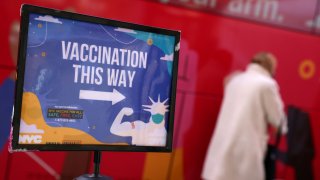
- Dr. Eric Topol is warning that Americans are "sitting ducks for the next wave" of Covid as the omicron variant takes hold in the U.S.
- "We're lagging behind what we need to get out to the American public" in terms of boosters, the cardiologist said.
- It's time that "fully vaccinated" is defined as three shots, Topol said.
Dr. Eric Topol is warning that Americans are "sitting ducks for the next wave" of Covid as the omicron variant starts to take hold in the U.S.
"We're lagging behind what we need to get out to the American public" in terms of boosters and what the U.S. considers fully vaccinated, the cardiologist and founder of the Scripps Research Translational Institute told CNBC's "The News with Shepard Smith" on Wednesday evening.
It's time that "fully vaccinated" is defined as three shots, Topol said. "We're in omicron land now" — and to have the most protection people need to get boosted, he said.
Topol's comments came after Dr. Anthony Fauci said Wednesday that there's no need for an omicron-specific shot. Rather, the White House chief medical advisor said the best possible defense against omicron is getting fully vaccinated or receiving a booster shot.
Get Tri-state area news delivered to your inbox. Sign up for NBC New York's News Headlines newsletter.
While delta remains the dominant variant in America, omicron now makes up about 3% of all cases in the U.S., and it's spreading fast. The World Health Organization said omicron is spreading more quickly than any previous strain.
Money Report
"It's doubling every two days or quicker wherever we are seeing it," Topol said, adding that though omicron infections are milder, "that's because of the people who are immunized or had prior Covid."
Hospitals are already seeing the surge. The University of Pittsburg Medial Center told CNBC its network of 40 hospitals and more than 8,700 beds are already close to capacity.






